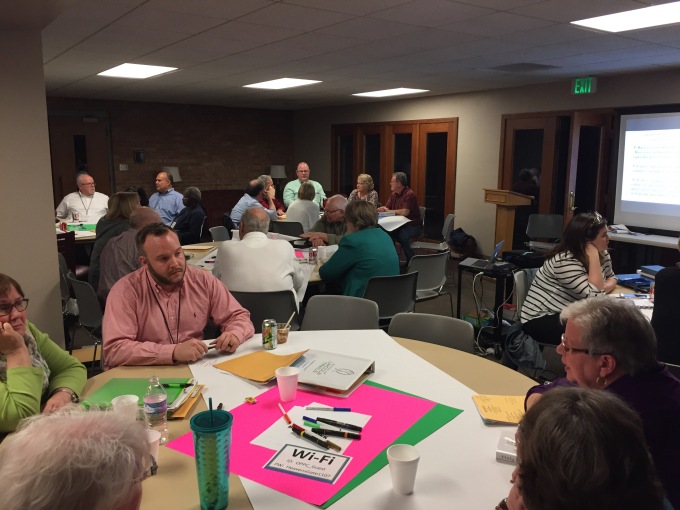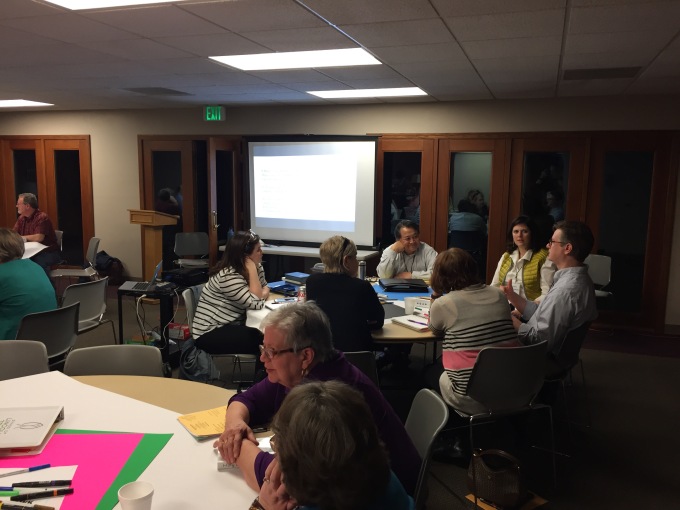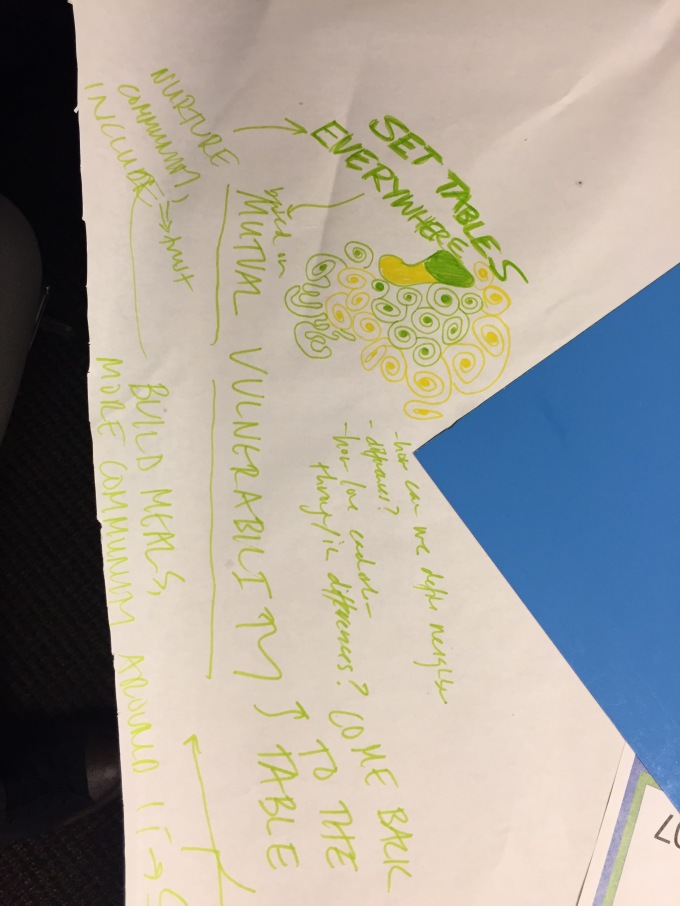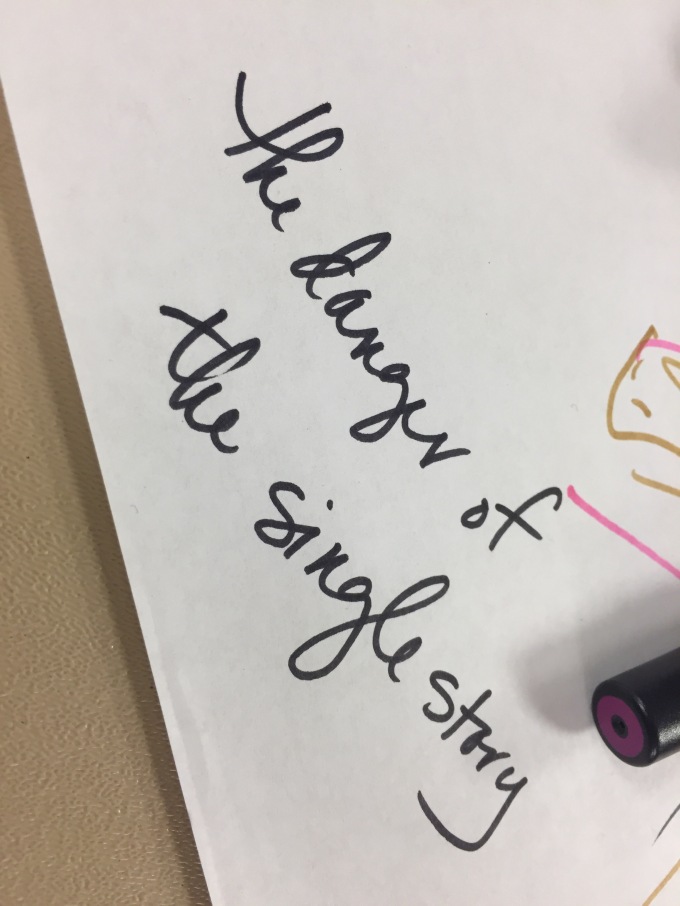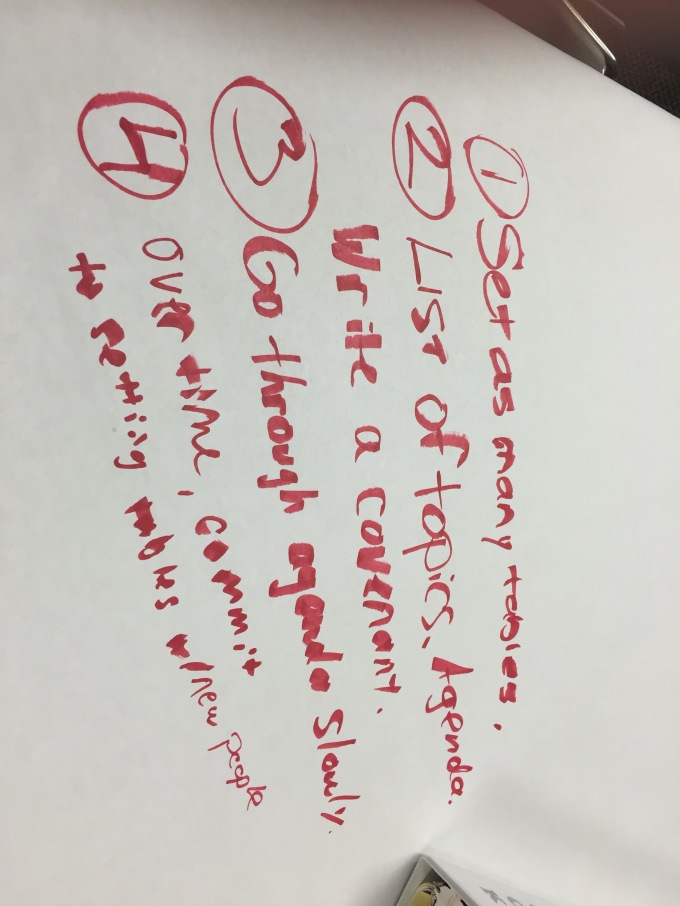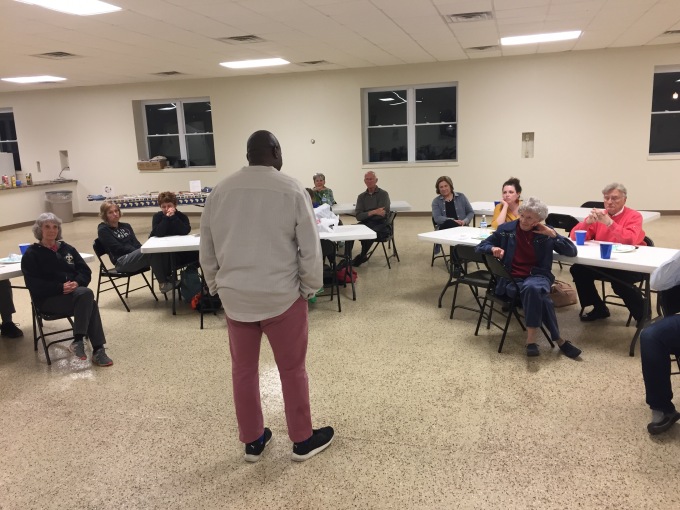How would MLK reflect on the level of integration within Christian churches of 2017? How would you? How would Jesus?
The table is central to sharing the Gospel because it is central to being a human being. A meal with others, when the intentional decency of Romans 14 is followed, allows us to share in our vulnerability (we need to eat!), for us to share our hospitality (we can share of our resources and our gifts!), and a place to tell and listen to stories. It is a prime place to be understood and to understand. It is level ground, there's no such thing as a sloped table with some sitting higher than others. Sure, there is often a human host who may assume a form of leadership, but Romans 14 urges that we humbly recall that the true host is actually Christ, guarding against any person-to-person hierarchies that may develop. Romans 14 sets the perfect table.
In our highly divided nation, in which the furors of 2016 were not the instigator of the division but rather, the boiling over of the reality that MLK called into question: the American church has failed to set ideal tables, tables that honor and reflect the diversity of God's kingdom, for centuries. And so we don't know one another, and, I would argue, we are unfortunately only able to understand God through the limits of our own cultural practices.
Let's step back into that pizza moment at Thanksgiving: while I admit if that were to happen at my table, my initial response would be to quietly find it odd and, well, out of place. But what if someone had the courage to ask the new family member, without sarcasm, "why did you bring pizza today?" And suppose that person answered with a story about a Thanksgiving from her youth in which her grandmother became gravely ill in the morning, and her entire family spent the day in the hospital in prayer and grief. And what if she said that the only thing the hospital cafeteria had on hand was cold pepperoni pizza? And what if she said that her grandmother's last words to her gave her such hope that at the end of one's life a person could have such faith in Christ? And what if she said that, from that day forth, she always has one piece of pizza on Thanksgiving to remind her of how thankful she is for her grandmother's witness?
I'm guessing that you wouldn't scoff at her decision to bring pizza anymore, and I'm guessing you would share in some sense of gratitude over the one piece that you took (unless you're that guy who took two and are now sheepishly trying to slip one piece back to the box without anyone noticing.) You needed to hear the story first, and you had to set your judgment aside to really let it touch you.
Of course, she might also say that she doesn’t like turkey, and pizza is simply her favorite food. But even then, we would have learned something about her, something about her humanity, and would have been given the opportunity to appreciate her honesty.
-----
 |
| Dwayne holding my daughter in 2010 |
When I first moved to New Orleans, I was a sixth grade teacher through the Teach For America movement. Also, I was hell-bent on saving
all these "poor" Black and Vietnamese kids in the Ninth Ward. As a person who passes for white in this modern day, I was deeply indoctrinated as a perfectionist. (Am I being glib mentioning that I pass for white?
Of course you do, you might say, you're a white guy! But it's important to remember that my German and Irish Catholic ancestors were not considered white upon immediately landing on this continent. They were the problematic “others” until it became politically prudent to draw new boundary lines around whiteness, of which my new neighbors in New Orleans are still not within, no matter how "high-yellow" their skin is. Whiteness was invented, and the heart behind it is sinful and idolatrous.) In 1999, I wanted to use my status as a self-righteous White person to bless these kids who I knew were given the shortest ends of the shortest sticks. I am locating my own whiteousness.
But, like I said, I am a perfectionist. Which is, to say, that I have bought into a lie that my performance will set me above my fellow brothers and sisters. I believe this stems from the same idolatrous spirit that invented whiteness. After all, what was the white status created for, what was it intending to accomplish? It was to self-select a sense of chosen-ness, a sense of privilege that set some people apart and more deserving than others. And, it worked. “White" is the normative and dominant standard in our cultural practices today. To value whiteness, though, requires that we imagine ourselves sitting at higher tables, that we believe we are somehow entitled to more. And within the communities that pass as white, we must then strive to be a
more perfect example of white values. There is nothing wrong with working hard to present the best example of your skills and talents. But whiteness sells us the lie that some people are more esteemed, more perfect, than others. If you are not feeling blessed enough, you can fall into the trap of believing that you're not meeting the standard quite well enough. Perfection-ism.
Is this not what legalism amidst the Pharisees was all about during Jesus' time walking the earth? I could earn my right standing with God and be seen as blameless? Is this not an echo of the clamor around the golden calf, a symbol of choosing to live by our own rules and standards, no matter how much Moses was glowing when he came down from the mountain to tell us God's will? Have we white people, and those who aspire to live like the white elite, thrown out the gift of our shared humanity for a chance to feel closer to God by believing we are the most special? That we can earn perfection by subscribing to a certain standard of culture and behavior? Was the social climbing that is the American Dream prophetically warned against in the tale of Babylon?
Romans 14 became a lived reality for me in New Orleans, when, feeling sorry for myself because I felt like an epic failure as a teacher, I was invited over to dinner by families of my students. Cedric's family, Deja's, Dwayne's, Roy's, Mai's, Isiah's, Leland's and others reached out to me. In stark contrast to the jeers I experienced in suburban Detroit over my vegetarian diet, I was taken aback to learn that not only had my students picked up on this detail, but often at dinners I found that a special pot of gumbo was made. Just for me. No jeering, only hospitality. And then, I would learn that in New Orleans East in the late 90's, vegetarianism meant that you didn't eat red meat. My special pot was filled with chicken and shrimp. I had a choice: I could point out the technicalities of their misunderstanding and educate this community on true vegetarianism. Or, I could just eat it. I chose the latter. And I chose to be taken care of by this new community. I relaxed, listened, told stories, and allowed them to see my imperfections.
 |
| Deja and Charlotte in 2010 |
If you asked me what I might describe salvation tastes like, I would say celery, bell peppers, and onions. It's what Louisianan cooks refer to as the Holy Trinity.
You see, I had to receive at the tables of families whom I thought I was there to save. I had to willingly allow my whiteousness to be dismantled. I had to start a process of allowing the fallacies of my perfectionism to be critiqued, laughed at, and exposed for the aggressive and destructive lie that it is. Perfectionism in this country is an insidious indicator of someone who subscribes, even subconsciously, to white supremacy. Not necessarily someone who would attend KKK rallies, but the very notion that one race is perfect and all others are substandard is the byproduct of a supremacist philosophy.
This was just the beginning of learning that diversity brings gifts, especially when bridges of new perspectives are allowed space to be told, space to be heard, and space to be pondered.
So I celebrate the gift of remembering that we are all invited to God's table. In fact, those discussions over gumbo were so filled with the Holy Spirit, so filled with prayer and hopes and laments, I am so grateful I did not choose to
educate when I was a guest at their tables. In turn, they did not expect me to be a perfect teacher, they just expected me to love their kids and do my best for them. What a relief it was to just be myself! And what an honor it was to be asked to help to teach their kids. Not to save them, but to love them and give them only my humanly limited best.
This is the heartbeat, for me, behind my calling to urge my brothers and sisters of European descent to regularly sit down at tables with people who look different to first listen, and also to share honestly. This is why I boldly, but humbly, ask my friends of African, Asian, and Native North and South American descents to be patient with me, as I am still in recovery, and with others who seek to understand but are still bound to the chains of this supremacist perfectionism that has informed every day of our lives. This is not easy. This is not Kumbayah. But I believe it is what is expected of us as Christians.
"One of the greatest tasks afforded to humanity is to stretch our theology, to expand our ideologies concerning God, and bring that experience to bear on and in those who need him most." - Dr. William Byron Reese Jr.
When we sit a table together and break bread, we remember that Jesus did this with and for us before he was murdered, and we can never outshine the supremacy of that personal sacrifice. When we share stories around a table, enjoying each other's foods, we open ourselves to learning about God from the Samaritan's point of view; from the poor white veteran who spent years in prison; from the Syrian refugee who stepped forward into the unknown with hope against hope; from the black woman who gets requests to empty an over-filled garbage receptacle while she is on rounds visiting her patients; from the father from El Salvador who is not as worried about his citizenship status as he is about feeding his children. Do we, as privileged white people have the only thing to offer when it comes to ideas about who God is? Absolutely, and thankfully, not. We have so much more to learn, and we ought to take that on as the gift that it is.
 |
| Cedric meeting Ruby in 2013 |
Because the alternative, for me, is to recognize that my privilege blinds me to my worldly riches. Furthermore, being oblivious to my advantages while lacking empathy for those without them marks me as the type of person Jesus was referring to in Matthew 19:24 who would have to somehow pass through the eye of a needle to enter God's Kingdom.
So here is where the real work begins. Pastor Alex Cornell, currently serving in Houston, recently challenged me: "Matthew, you preach a good word reminding us that Jesus aims to teach us through the Samaritans in our lives. Who would you say are
your Samaritans?" Now he knew that, for me, it is not the black people on the other side of 8 mile from my suburban Detroit upbringing. He knew that for me, I have already found great encouragement from sharing life with my undocumented neighbors in Los Angeles. He was leading me to ponder these questions:
Can I, Matthew, sit at a table with someone who voted for Donald Trump specifically
because of his racist rhetoric, and can I learn anything about God from that person? Could I have the courage to share my stories and pray that they, in turn, learn something about God from my perspective? Certainly, there is always risk of being shunned and shut out, but the heart of our work at the Table Setters is to take very seriously the work that we believe Jesus lays out for us, the missions and promises that Paul reiterates in Romans 14 for the early Church.
The Kingdom of God is not bubbled into red-lined safe havens, marked and divided by zip codes. There are the believers and the non-believers, sure, but amidst the believers, not one of us is more special or more beautiful than our sister or brother. (And, Jesus died for the unbelievers too, we must not forget!) Not one of us is more worthy because of our perspectives. Even if we figured out how to scientifically rearrange our atoms so that we actually could pass through the eye of a sewing needle. No, God created us as diverse in skin, body, and perspective for a purpose, and it's time to throw out the idol of Whiteousness so we can experience a fuller picture of love, mercy, grace, and celebration.
My co-founding partner and I have started
the Table Setters because our long friendship has taught us so much more about who God is than either of us ever knew before. Why should that matter? Because the odds of us becoming friends, having been born on two different sides of the country twenty years apart, him being an adopted black man to two black parents in the urban sprawl of the Bay Area, me being born to two white parents in the suburbs, it wasn’t going to
just happen. Our country is not currently arranged for these kinds of friendships to organically occur. We had to make choices to move in a direction towards one another, and that movement, we believe, has important implications for us as Christians and for those of us who live in increasingly diversifying communities.
So let’s agree to use all our energy in getting along with each other. Help others with encouraging words; don’t drag them down by finding fault. You’re certainly not going to permit an argument over what is served or not served at supper to wreck God’s work among you, are you? I said it before and I’ll say it again: All food is good, but it can turn bad if you use it badly, if you use it to trip others up and send them sprawling. When you sit down to a meal, your primary concern should not be to feed your own face but to share the life of Jesus. So be sensitive and courteous to the others who are eating. Don’t eat or say or do things that might interfere with the free exchange of love. Romans 14:19-21 MSG

 Spring has arrived now.
Spring has arrived now.